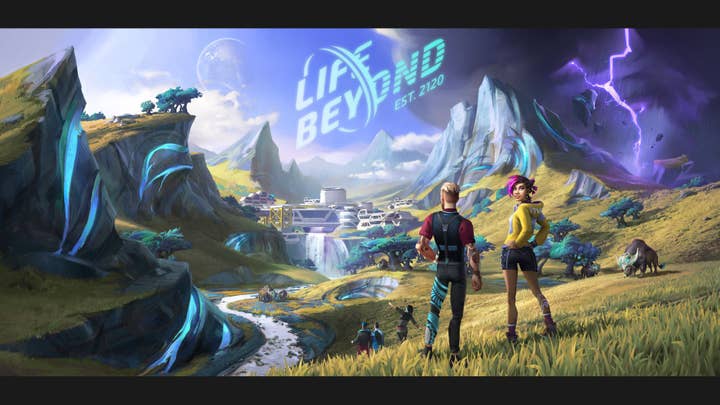Five things to consider when building games for future players
Benjamin Charbit shares the lessons he's learnt about the audience Darewise Entertainment is targeting: Gen Z
Developing games requires an intimate understanding of your desired audience. That understanding is based on experience, research, concrete information, and some generalizations.
We all dream of making games that appeal to large pools of people. If we used age and gender as our barometer, which many publishers do, that would mean making games for 35 to 44-year-old gamers with a split that favors men more than women. But what about other gamers? Gen Z and beyond?
One of the reasons we decided to self-publish our game was so we could pick our audience. In our case, as you have guessed, that audience is Gen Z. To us, they are a fascinating and inspiring generation.
Born after 1996, Gen Z is poised to become the largest demographic in games. In the US alone they number over 68 million, and globally they make up roughly 32% of the population. What's more, they are just beginning to garner purchasing power.
Gen Z is poised to become the largest demographic in games
Not to be confused with Millennials, who came before them, Gen Z is very different in how they consume content, interact with brands, and share. They are the first true "digital natives". They have never known a time without the internet, social media, or mobile phones. They move between the digital and physical world with fluidity. They get their news from non-traditional sources.
They favor social media platforms that are more about visuals and less about sharing updates. Though still vital for keeping up with friends, social media is more of a platform for content and entertainment consumption without brand interruption. In short, social media is their one-stop-shop for content, social, and self-expression. And last but not least, Gen Z is the first generation who's grown up with gaming being its first entertainment source.
Here are five takeaways we have learned about our audience, from our open development and research.

Community-oriented
People that make up Generation Z are social animals. What is exciting to us is that this generation is more likely to have friends that they have never met in real life. It's not the "physicality" that matters but the shared interests, connections, and so on.
These relationships are as important as any others because they are real. And because they share similar interests, these individuals gather in communities and they belong to multiple of them.
It's undeniable that gaming has gone social. But we should support the full breadth of social interactions and community making, beyond the traditional friends/party/guild and messaging systems.
Games and experiences should also provide users with the ability to interact with their preferred social platforms and offer tools that guarantee a friction-free experience where players can create and easily share content with friends and others outside of the game, without leaving the game.
The claim for creativity
Not so long ago, artists had to deal with many prejudices in a society that preferred careers based on rationalism, facts, science, capitalism. In 2021, investment banks and all related careers struggle to recruit young graduates. Instead, they are looking for more positions where they can be creative.
We need to design games that offer tools to create and share user generated content [and] tools to monetize this content
Instagram filters, live streams and customizing features on TikTok have empowered Gen Z to become, in a way, self-proclaimed artists. Just spend a minute on TikTok to see the level of creative juice that this generation pours into the world.
Let's keep in mind that this generation grew up creating meaningful content in Roblox and Minecraft. As this generation graduates from these experiences to other options, it takes for granted the level of agency and control over the game experience it is used to.
As developers, we need to design games that offer the same depth of in-game tools to create and share user generated content. And I dare say that providing them with tools to monetize this content is about to become a necessity.

Engaged
Gen Z, through its use of social media, has demonstrated to the world its ability to move the needle. From MeToo to Friday For Climate to BLM, they have proven that no action is too small, no individual is too marginal, no one is superior or inferior. What matters is that whenever someone somewhere does something, all others can benefit.
Knowing this, IPs and game mechanics must resonate with a similar desire to make the world better, but it doesn't have to be heavy handed. Gen Z is not into token gestures and are quick to call out brands that are disingenuous with their actions.
Gen Z is not into token gestures and are quick to call out brands that are disingenuous with their actions
Consider organically integrating story lines and game mechanics that are fun, worthy of sharing, and speak to some of today's climate, political, and social economical inequalities.
Fluidity
Gen Z moves with great fluidity between the digital and real world. They slip between communities and experiences with ease. Yet, we see the industry continue to build captive and closed experiences when the future audience prefers freedom of movement.
For this generation, games must allow for interaction with platforms and content they enjoy. Integrate Discord. Integrate Powder. Use existing platforms and organically build them into your game so that Gen Z can share, create content, and socialize in-game and in other platforms and the real world.
Fluidity counts in game sessions too. Too many games today still require planning for a 1-hour + game session. Create games that not only thrive in long play sessions but provide meaningful short experiences as well. Fortnite does a great job of this, as does Among Us. Short play sessions, yet players spend hours enjoying these games.
Non-binary
Previous generations have been more binary in their thinking. There is an inherent need to analyze, process the things of the world with dichotomy. Think work vs fun or work life balance or the digital world vs the real world.
However, Gen Z is non-binary. They are more open to not fitting neatly into rigidly defined categories. Concepts like work and fun do not have to be diametrically opposed forces. Digital and real world don't have to be separate or contradicting experiences.

When creating a game, it is important to think of how to organically converge socially with gameplay, digital and real-world experiences, work and fun.
User generated content should provide players with the opportunity to earn a living. Giving them the in-game tools and features that allow them to flow in and out of the game world, to bring the digital into the real world and vice versa. We used to call it transmedia, but really it should all be part of the game, considered as one, rather than being separate things.
What does this all mean?
There is a new generation of gamers growing up and soon they will be the largest group of gamers this industry has ever seen. And while the industry continues to build for the "average" gamer, we need to look to the next generation, to their likes and dislikes, the way they interact with and see the world around them and build for them.
At Darewise, we are focusing our creative efforts on building a fun game that brings people together and rewards them for cooperating. We're prioritizing features that allow players to build friendships and communities, share experiences via their preferred social channels, create content and perform services with the opportunity to earn a living. After all, it's not because it's digital that it's not real.
Benjamin Charbit is the founder and CEO of Darewise Entertainment. He started his career as an investment banker, but was soon overtaken by his passion for video games. He joined Ubisoft and cut his teeth as a live content producer and director on Assassin's Creed before creating Darewise.